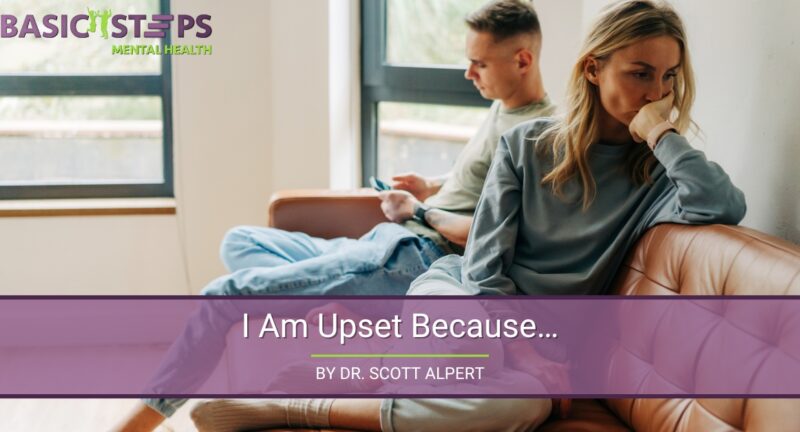
Re-Centering
When the stormy days hit, when you don’t even like yourself, there are a few things you can do to get yourself through until you find that happy foothold again. Spiritually speaking, it is easy to be spiritual on the mountaintop. However, the real challenge is taking that spirituality into the valley.
If you find your heart racing, feel dizzy, like you’re going to pass out, and fear you might die—well, join the club. My panic attacks led me to go through all kinds of testing, only to find that the root of my physical symptoms was emotional.
There is a positive to the anxiety attacks. What I have learned is that our emotions have a mind all their own. When I don’t listen to myself and keep pushing my problems to the side, my emotions get disturbed, and their only way to grab my attention is by turning up the juice. No, my heart palpitations weren’t a sign of a heart condition, but an emotional condition I had been avoiding since my early childhood.
As a teen, I had radioactive material injected into my veins by the doctors at Children’s Hospital to monitor my organs. Of the 32 children studied for heart problems in one study, I was the only one who didn’t need corrective surgery. That alone was anxiety-provoking. What the doctors failed to take into account were the effects of my violent father. It wasn’t until I went through counseling that my anxiety began to fade.
We cannot outthink an emotional wound. A simple hug would work much better. But we bargain with ourselves, believing that if we were to do this or that, or if they had said they were sorry, we’d get better. Cutting to the chase: our healing isn’t going to come from them or from make-believe that, if we had done something differently, we would be fine. Life takes place in the manner it needs to, and sometimes it doesn’t go your way—and that is fine. Your relationship with yourself in this moment of time is what you ultimately have. Do you choose to beat yourself up? If so, why? If you choose to be your own best friend—well, which of these do you choose?
If you’ve hit the wall and find yourself in bed—hopeless, helpless, panicking, and feeling worthless—the good news is that you can recover by your own hand, if you’re willing to make the effort. And yes, people will fight this, insisting they need to have a drink, use some substance, or take harsh medication. Look, in extreme cases, medication is prescribed to hold you in place until your body finds its center again. However, the root cause of your upset is emotional, and your emotions need to be addressed once and for all. You know what lies at the root of your problems. Believing in ‘forgive and forget’ doesn’t work. Your negative feelings will not go away until they are properly addressed—and if you fail to do so, they will return again and again and again.
We go through the downs for a reason. Anxiety is our emotions’ way to grab our attention so healing work can take place. I often visualize that there is a part inside me that got wounded, has been ignored, and wants to get my attention by pushing the anxiety button deep inside me. Feeling this, I then take my herbal remedies, exercise, tell myself I am fine and suck things up, but deep down my emotional part gets frustrated and pushes the button more and more, eventually just holding the button down.
Let me share with you the tools I use that help me address all of my levels. Some are easy, some take more effort—but are you willing to make the effort at all? I am still amazed by people who spend years in counseling and fail to follow my dictates. I am not there to inflict pain but to share the healing journey, only to be met with resistance. Oh, I will never push, and if they want to talk about their resentments, I will listen—but this isn’t the way to heal. Addressing the core wound with love will. Or, in the example above, paying attention to the internal button-pusher so he or she finds the relief they desire.
1. Setting Intentions
In order to improve your mood, the first step is simply setting an intention. An intention is simply stating to yourself what it is that you want. And be honest—do you really want to heal? If not, the intentions you set will lead nowhere. Have you ever asked yourself what it is you want? You may know what you don’t want, but what is the opposite of that? ‘I don’t want to be depressed.’ ‘Then what do you want?’ I will ask. ‘I guess to be happy,’ they will reply feebly.
We don’t know what it is to be happy. That is confusing. Oh, we know sadness and pain. These are familiar, so we recreate sadness and pain on a daily basis because it is our comfort zone. Being happy can be so foreign, so distant, that we feel it will take superhuman strength to create even a glimpse of it. Then, once achieved, how long is this happiness going to last before it returns to sadness? Does this look familiar? This is why using daily tools to anchor yourself in the goodness of life is important. And if you are looking for someone to give you your happiness, let that go. Nobody but you can make you have lasting happiness.
I stay on this topic for a reason. You are more powerful than you think, and holding on to your darkness only leads to more darkness. Going to the light means making the effort each and every day until it becomes locked in, and the light just becomes who you are.
State your intentions using this format: ‘My intention is …’ For example: ‘My intention is to be calm.’ Simple and right to the point. Focus on obtaining the prize. Stay in the positive by avoiding the word ‘not.’ For example, ‘My intention is to not be depressed.’ In this case, the ‘not’ is not heard, and what is heard is ‘My intention is to be depressed.’
Try this: Try not to think about a black horse. And what did you think about? Of course—the black horse. Focus on what you do want, and you will create that.
2. Centering
Take in a deep breath, exhale, and center yourself in your loving heart.
Loving heart? Many ask what that means. If you have never experienced love it can seem confusing. Cutting to the chase, imagine that you are holding a small puppy or kitten in your lap. If warm feelings surface, that would indicate that you actually have loving feelings. The next challenge is to see how long you can hold onto that feeling. If this seems far-fetched, that is okay. I am here to point you in a direction that worked for me but have no control over what you will do. If you are happy with where your life is at—making yourself right, holding onto resentments, and wanting to get revenge—then by all means, continue to do so. However, if you are sick and tired of being sick and tired, you may owe it to yourself to first ease up on bashing yourself and others, and move more into viewing the goodness that lies inside yourself and others. We are not all bad.
Hey, look—when I was taught this stuff, I was skeptical. What kind of cult were they trying to get me into? But we’re talking about surrounding ourselves with something that feels good and is good for our health and well-being. Yes, it is weird to let go of hate and focus on love, but after you do so for a few days, notice how you improve on all levels. Physically, you may have more energy, your thoughts may be more positive, you start to actually like yourself, and God isn’t some force trying to damn you. You decide: positive or negative? What is your intention?
As for me: “My intention is to be in my loving heart.”
3. Take care of your physical body
Flushing your body with at least half your body weight in ounces of water, eating enlivening food, getting in at least a half-hour of exercise, and getting adequate sleep all help your body recover properly.
4. Take care of your mental self
Try this: take out a small pad of paper and keep a tally of every negative thought you have in 15 minutes. Challenge yourself. Try to remain positive—if you can. This battle between our dark and light has physical consequences. It has been proven that every negative thought takes 7 seconds of life away. Candace Pert earned her Nobel Prize by proving that when we have positive thoughts, the brain secretes neuropeptides that enhance our immune system, improve digestion, slow down the aging process, and keep us younger.
Repeating a positive affirmation will help you remain positive. List how you want to feel. After compiling your list, choose the top three qualities you want and put them in this format:
“I am a __________, _____________, and _____________ man/woman/person/human being.”
For example: “I am a calm, positive, and happy person.”
Once completed, repeat that statement 100 times a day—every day for a minimum of 32 days. This will help train you to focus on the positive. And yes, you will hate the statement because your shadow will be threatened by the positive words, but stay with it, because once the statement takes hold, your old familiar pattern will fade.
4. Emotionally
“When love is applied to hurt, we heal.” This is the slogan of Spiritual Psychology. Here, love is seen as the ultimate healer. Ride back a current emotional reaction to where it began. Talk with that younger part inside of you by using opposite-hand writing. Allow your dominant hand to represent the current you, and your opposite hand to represent your wounded younger self, and have a conversation on paper—with the current you showing compassion to your younger self. This is core work that may need assistance from trained professionals. Ultimately, listen to that pent-up part inside of you and let it purge all the hurt and frustration. This is the hero’s journey and the path less traveled.
Let’s pick up here next week and focus on other tools that help take care of our emotional needs. Giving yourself a hug and becoming your own best friend tops the list of how to care for that afraid part inside of you that is hiding and fearful. These self-help tools work best if you continue to use them each and every day.
Compassionate Care is Always Available
There are many more tools and strategies you can use in your pursuit of happiness. Here is where we come in. Contact us at Basic Steps Mental Health and let us support and educate you on this journey back to your loving heart center. Imagine living a heart-centered life, regardless of what is happening externally. We’d love to be of help.
For 25 years, Dr. Scott Alpert, the clinical director of Basic Steps Mental Health, has treated over 7,000 people with mental health and addiction problems, using a Psychological approach that mixes and matches ten of the top approaches used in the industry. We are here virtually and in-person to help you get through this COVID-19 pandemic and many other difficulties you may be experiencing.
May you have good mental health.
Related Posts
A Tribute – Thank You for My Tears
I often call myself a dinosaur because I grew up in a different era where the...
I Am Upset Because…
Have you ever considered that what you see is make-believe? That people...




